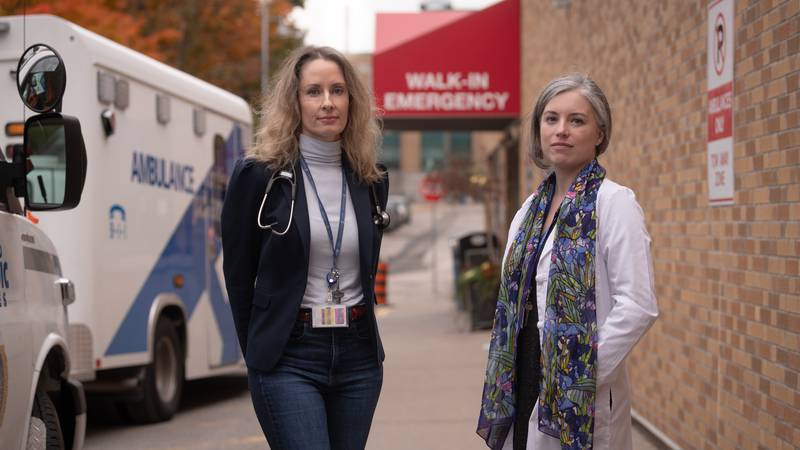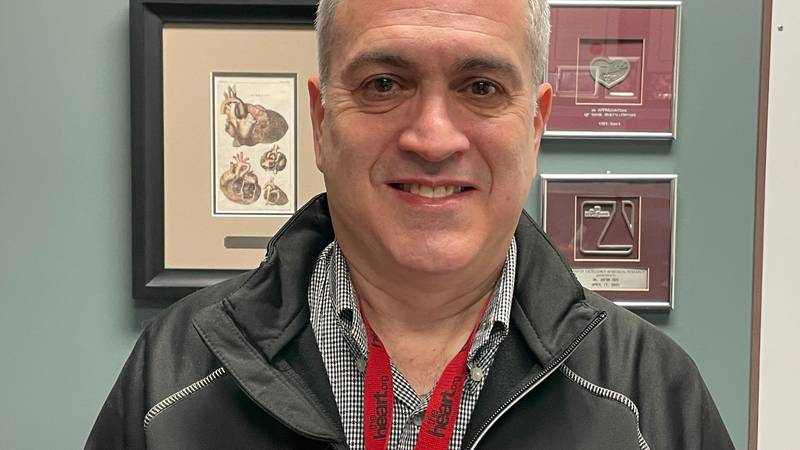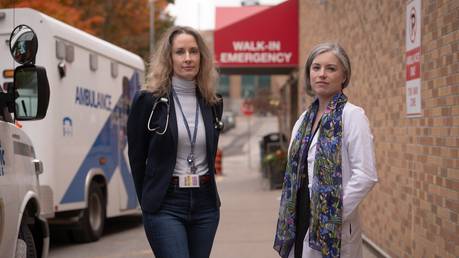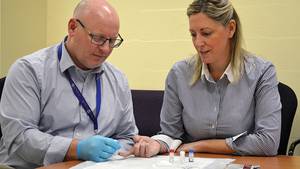A new national study is looking to better understand how COVID-19 affects heart health — and one QEII researcher is contributing his expertise.
Dr. Jafna Cox is a world-renowned QEII cardiologist and the former Heart and Stroke Foundation of Nova Scotia Chair in Cardiovascular Outcomes Research. He is also a professor and researcher at Dalhousie University, specializing in the prevention of cardiovascular disease.
In 2021, Dr. Cox joined a study at the Institute for Clinical Evaluative Sciences (ICES), a not-for-profit research institute with a mission to translate data into trusted evidence that can be used to inform public policy and healthcare decisions. The study was inspired by growing concerns about the relationship between SARS-CoV-2 — the virus that causes COVID-19 — and hypercoagulation, a potentially life-threatening condition that increases the risk of blood clots.
Evidence now reveals that COVID-19 triggers the production of antibodies circulating throughout the blood, causing clots that can affect vital organs such as the heart, lungs and brain. Recent studies have shown that about 20 per cent of people hospitalized with COVID-19 developed a blood clot; this number was as high as 30 per cent for people in the ICU.
“Once a blood clot happens, it can lead to very bad outcomes,” Dr. Cox says. “People were developing blood clots — especially in the veins — and we wanted to see if there was anything that could be done to prevent that from happening.”
Dr. Clare Atzema and Dr. Candace McNaughton were on the front lines in the early days of the pandemic as emergency department physicians at the Sunnybrook Health Sciences Centre and senior scientists at the Sunnybrook Research Institute in Toronto.
The risk of patients developing blood clots inspired Dr. Atzema to obtain funding from the Sunnybrook Research Institute to spearhead a study on the association between anticoagulation therapy and patient outcomes. As a member of the Canadian Cardiovascular Society, the national organization for cardiovascular clinicians and scientists, she had previously worked with Dr. Cox. She immediately invited her Halifax colleague to become part of the study.
Dr. Cox, the only contributor not based in Ontario, agreed to join the team that included emergency department physicians, pharmacists, bio-statisticians, cardiologists and coagulation experts.
The study focused on people 65 years and older who tested positive between Jan. 1 and Dec. 31, 2020, and compared the risk of hospitalization or death, over the 60 days following diagnosis, between people who received treatment with blood thinners and those who did not.
Research showed that people who were taking anticoagulants (“blood thinners”) had a three per cent lower risk of hospitalization, and about a two per cent lower risk of death in the short-term, compared to people who were not taking a blood thinner.
ICES was crucial to the Ontario study, offering access to very large and comprehensive data sets from various registries, and in turn can give precise insights into diseases and patterns. It also has information on medications and procedures that patients are receiving, as well as vital statistics such as deaths.
“The data available from ICES is something that cannot be found anywhere else,” Dr. McNaughton says. “It has more than 20 years’ worth of institutional and expert data.”
Canada’s most populous province, Ontario, has data on millions of patients, making it ideal for a large observational study, comparing the outcomes of COVID-19 patients who received anticoagulation therapy with those who did not.
“We were able to show that outpatients who were on anticoagulants tended to have a better outcome, in terms of fewer deaths and a reduction in hospitalizations,” Dr. Cox says.
As part of the growing literature on COVID-19, the study’s finding is just one piece of the puzzle when researching how to prevent blood clots for people with COVID-19.
“It doesn’t argue that everybody who has COVID should be on an anticoagulant,” Dr. Cox says. “But certainly, anybody who is at high risk for clotting should be receiving anticoagulant therapy.”
The risk of clotting is higher for older adults, people who have a history of clotting, or those who have conditions such as atrial fibrillation and cancer. Smoking and extensive inactivity are also risk factors.
Anticoagulant medications are highly effective at what they do, Dr. McNaughton says, but alludes they also come with unique risks and should only be used under the care of a medical professional.
Fortunately, the COVID-19 vaccination lowers the risk of developing a blood clot in the lungs or legs by about 50 per cent, she adds.
“The best way to prevent blood clots — and other complications from COVID — is to not get infected,” Dr. McNaughton states. “Wear a KN95 mask or better while indoors and in crowded areas. Stay up to date on vaccinations, test if you have symptoms and isolate if you are sick.”
As the country navigates the aftershocks of the COVID-19 pandemic, the work of Dr. Cox and other experts continues to save lives in new, innovative ways.











